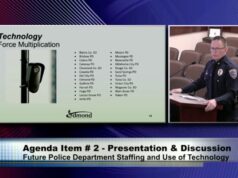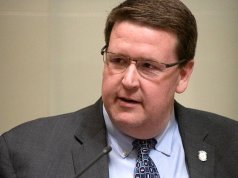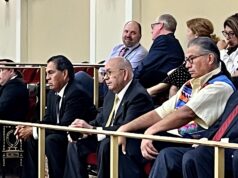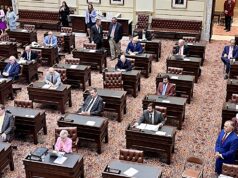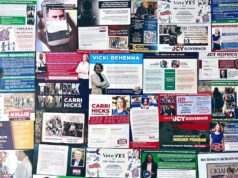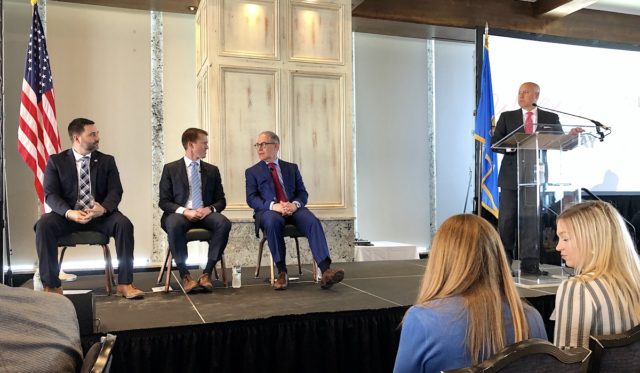

During a Republican U.S. Senate candidate forum hosted today by the Petroleum Alliance of Oklahoma, former Attorney General Scott Pruitt, State Sen. Nathan Dahm and Luke Holland — the chief of staff for retiring U.S. Sen. Jim Inhofe — called for U.S. energy independence, criticized regulatory bureaucrats and expressed concern about the civil law implications of the McGirt v. Oklahoma decision.
The hour-long U.S. Senate forum was full of red meat for GOP primary voters, who will select from a field of 13 candidates June 28. But the day’s discussion was not as full as it could have been.
Petroleum Alliance President Brook Simmons said six Republican candidates originally confirmed for the event, but he said 2nd District Congressman Markwayne Mullin, former House Speaker T.W. Shannon and Alex Gray ultimately decided not to attend for one reason or another. At the end of the forum, Simmons played a video Mullin recorded from Washington, in which he said he had to attend a briefing on security issues.
Lower-tiered candidates — as well as former Democratic 5th District Congresswoman Kendra Horn — were not invited to the organization’s forum.
“One of the things that I want to ask you to do,” Simmons told his membership, “is give a round of applause to these guys who have shown respect and honored you by being here.”
Socialists, Marxists and math
When it came time for the three candidates to make their remarks, Dahm and Holland repeatedly referenced “socialists,” “marxists” and “the left.”
“They’re trying to kick God out of absolutely everything, they’re trying to kick parents out of classrooms, and they’re trying to shut you guys down,” Holland said. “I want to restore America’s foundation.”
Holland, 35, said those who question whether he is too young to serve as a U.S. senator should look to the fact Inhofe has endorsed him.
“When you average my age with Jim Inhofe, I’m actually 61, which is the perfect combination of wisdom and energy, right?” Holland said, referencing his 87-year-old boss.
Dahm (R-Broken Arrow) discussed his time in the State Senate and his experiences in Romania, where his family does missionary work.
“My parents moved from Broken Arrow to eastern Europe, in Romania, when I was 10 years old to serve as missionaries. They’re still over there to this day. They are four hours from the Ukrainian border. They are helping Ukrainian refugees,” Dahm said. “I have personally experienced what it’s like to live under socialism (and have) experienced communism. I know there are actual socialists and marxists trying to destroy our country and take us down that path.”
Pruitt played heavily to the day’s audience, emphasizing his time as Oklahoma attorney general and as administrator of the Environmental Protection Agency under former President Donald Trump. Pruitt, who resigned from the federal position in 2018 amid a barrage of questions about his office’s spending habits and other ethics matters, emphasized the need for “regulatory certainty” for the petroleum industry.
“It’s hard to invest capital today when the administration tomorrow is, what, criticizing fossil fuels and saying we don’t need fossil fuels for our future?” Pruitt said. “It’s hard to take that risk.”
Candidates talk Indian Country reservations
Simmons asked the candidates about the impact of the McGirt v. Oklahoma U.S. Supreme Court decision, which affirmed the Indian Country reservation of the Muscogee Nation and was subsequently cited in state court affirmations of the Chickasaw, Choctaw, Cherokee, Seminole and Quapaw reservation.
“While we expect some additional clarity, the courts have recognized that the reservations of the five tribes remain established as they existed at statehood,” Simmons said. “The law enforcement challenges seem difficult to navigate, and questions about important civil issues remain. How will you lead on this issue if elected?”
Holland answered first, referencing a trip last year to the Federal Democratic Republic of Ethiopia and a conversation with Prime Minister Abiy Ahmed, who is tasked with governing a citizenry composed of ethnic and cultural factions trying to co-exist in a complex political environment.
“He asked me, ‘Young man, what do you think about all of this?’ I said, ‘It sounds like what you’re trying to do is put things back together,'” Holland said. “What the left is trying to do in America is tear us apart. The socialist left is trying to divide Americans up into hundreds of different groups that all hate each other. We have a situation here in Oklahoma where you have some groups of people who are going to be enforced with the law against (them) in a different way than somebody else. If you have victims of crime who get some justice in one way and others in the same category — just because they have a different race — they aren’t faced with the same penalties? That is the first step you need to take if you are trying to divide a state in half. Or divide a state into different parts. As soon as we start treating people differently, once we no longer have equal justice under the law, then you have chaos.”
Holland said, right now, the McGirt decision has mostly been applied to criminal law.
“If there was a step taken to achieve this on a tax side or a regulatory side, then the game is over and it just all falls apart, right?” Holland said. “So we have got to work to put things back together. We can move forward and have one united Oklahoma, and I am going to work very diligently to do whatever is necessary to accomplish that.”
Pruitt called the McGirt decision “very consequential to the state of Oklahoma.”
“Many folks attribute the impact of that decision only to criminal jurisdiction, and that couldn’t be farther from the truth,” Pruitt said. “When you look at that decision, it has wide-reaching effects with respect to the state’s taxing authority, regulatory authority, and I would say to your ownership interests — when you think about mineral interests in the state of Oklahoma, how will that be impacted by the McGirt decision? And I think it is very, very questionable whether the certainty that we’ve had with respect to title and ownership, along with regulatory oversight and in addition to taxation authority, will remain consistent and, I think, certain in respect to that decision.”
Pruitt said clarity is needed and that Congress “has a role to play.”
“We don’t have to be dependent upon the court system to provide solutions in this process,” Pruitt said. “We don’t need to be dependent upon the outcome from a court decision. (…) What we should do is use Congress and legislation — and Congress has every right to do this — define the authority of the state with respect to tribal lands. They can assign jurisdiction to the state with respect to prosecution. They can assign jurisdiction to the state with respect to regulatory policy, and they can provide the kind of certainty we need as a state with respect to that McGirt decision.”
Pruitt said the situation is one of the “most consequential issues in the foreseeable future” for the petroleum industry and other economic areas.
“Anyone who tells you that decision isn’t going to have impact in the state beyond criminal law is just simply not telling the whole story,” Pruitt said.
Dahm criticized the majority opinion in McGirt at length.
“It is so convoluted and contradictory in so many ways, and it totally neglects the history of Oklahoma,” Dahm said, referring to an attempt by tribal nation leaders to create the State of Sequoyah in 1906. “They were trying to join the union as a state. Now you cannot tell me that they believed they would be able to create a state but still have full sovereignty. That’s just not within the realm of plausibility.”
Dahm said he has committed to introduce legislation in the U.S. Senate on the topic.
“Tribal members are the citizens of the United States, they are citizens of Oklahoma, as well as members of their own tribes and their own tribal citizenship,” Dahm said. “So we do need to come together and come up with a solution for the people of Oklahoma, and when I say ‘the people of Oklahoma,’ that includes the tribal members. We do need to get them to the table and have this conversation.”
The answers of Holland, Pruitt and Dahm could frustrate tribal leaders, who view America’s history of breaking agreements with their tribal nations as key to understanding the modern context of Indian Country in eastern Oklahoma. The two candidates most widely viewed as leading the pack in the open U.S. Senate race are tribal citizens. Mullin is a citizen of the Cherokee Nation, and Shannon is a citizen of the Chickasaw Nation.
‘We need more civility in the U.S. Senate’
Of the three candidates who appeared at Wednesday’s forum, Pruitt spoke the most about civility and bipartisanship.
“I think it’s important as a U.S. senator that you are about boldness and courage and conviction and advancing answers to these key issues, but not to take it personal. I think we need more civility in the U.S. Senate and more courage. Both matter,” Pruitt said. “Our Congress today is dysfunctional to the point that the rest of the world looks at Congress and says, ‘They can’t govern themselves anymore. They can’t self-govern anymore.’ And I think, largely, that is true. So there needs to be strong leadership in that body, but strong leadership in that body that is also committed to reaching across the aisle, reaching out to others who disagree and say, ‘Let’s use this body in a mature, adult way to tackle the big issues in this country.'”
Holland was the main candidate to discuss foreign affairs, calling China “our biggest threat globally on the stage right now.”
“We’re really vulnerable. It’s a big threat when you look ahead the next 10 or 20 years,” Holland said. “They have been putting billions and billions and billions of dollars into their military capability — and they’re using our trade deficit debt to do it — and they want nothing more than the rest of the world to look at them as the very best. They want the whole world to revolve around them instead of around us.”
Holland said the best way to for America to protect against China is “for them to know that if they pick a fight with us, we’re going to crush them.”
Dahm said the federal government has overreached its constitutional authority on a myriad of topics.
“Washington DC has grown into this behemoth — this be-all, end-all,” Dahm said. “I have pushed for federalism at the state level.”
Follow @NonDocMedia on:
Other candidates in the race, not in the forum
With 13 candidates in the June 28 GOP primary election, Republicans are likely to face an Aug. 25 runoff between the top two finishers.
In addition to Dahm, Gray, Holland, Pruitt, Mullin and Shannon — who were invited to Wednesday’s U.S. Senate forum — seven other GOP candidates with less public service experience are also running for Inhofe’s Senate seat:
- Adam Holley, a Bixby resident,
- Jessica Jean Garrison, an Owasso resident,
- Laura Moreno, an Edmond resident,
- Michael Coibion, a Bartlesville resident,
- John Tompkins, an Oklahoma City physician,
- Randy Grellner, a Cushing physician, and
- Paul Royse, a Tulsa resident.
On the Democratic side, Chickasha native Kendra Horn is making her first bid for U.S. Senate after losing her 5th Congressional District seat to Stephanie Bice in the 2020 general election. Horn upset then-Rep. Steve Russell in 2018 to win that seat.
Cleo Springs resident Ray Woods, who challenged Inhofe in 2014, has also filed to run for the U.S. Senate seat as an independent. Libertarian Robert Murphy will also be on the ballot.
(Editor’s note: The Petroleum Alliance of Oklahoma is a 2022 charitable sponsor of the Sustainable Journalism Foundation.)










